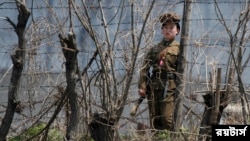The Democratic People’s Republic of Korea, or DPRK, government has one of the worst records of human rights violations and abuses, both within its own borders and abroad. These include executions, assassinations, intimidation, unlawful detentions, and abductions, including from Japan and the Republic of Korea.
At the UN Human Rights Council in Geneva, U.S. Special Envoy on North Korean Human Rights Issues Ambassador Julie Turner expressed deep concern about continued impunity for perpetrators of human rights violations and abuses in the DPRK. She urged the North Korean government to make significant changes:
“Immediately dismantle political prison camps, release unjustly detained political prisoners, and institute protections against arbitrary detention that guarantee respect for fair trials and other protections.”
Ambassador Turner also called on Pyongyang to cease all forms of forced labor and compulsory work and respect internationally recognized labor rights.
Ambassador Turner called on North Korea to address the issue of abduction:
“Provide a comprehensive and transparent record of all abductions, including of foreign nationals, and facilitate reunification of divided families, including abductees, detainees, and unrepatriated POWs.”
The United States further advised Pyongyang to revise legal terminology on persons with disabilities to address discrimination and align with international best practices.
The United States calls on the DPRK to abide by its obligations under international law, to take immediate steps to end all human rights violations and abuses, and to engage with the UN’s human rights experts.
It is incumbent on all member states, including the People’s Republic of China, which shares a land border with the DPRK, to uphold their respective international legal obligations and to respect the principle of non-refoulement, which forbids deporting people to countries where they face persecution or danger. Indeed, numerous UN and NGO reports have confirmed that returnees to the DPRK are often subjected to torture, sexual and gender-based violence, forced labor, or execution.
Speaking to the North Korean People, U.S. Ambassador Michèle Taylor, Permanent Representative to the United Nations Human Rights Council has said, “I want to tell you that we see you, we hear you, we remember you. You are not forgotten, and we will not stop advocating for you.”






